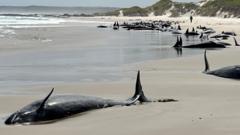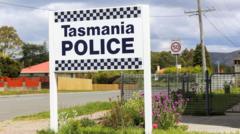In a heartbreaking decision, Australian authorities will euthanise nearly 90 false killer whales after a mass stranding, as attempts to rescue them have been thwarted by challenging conditions. This incident raises concerns regarding the frequency of such strandings in Tasmania and the vulnerabilities of marine mammals.
Euthanasia Decision Made for Whales Stranded in Tasmania Due to Complex Challenges

Euthanasia Decision Made for Whales Stranded in Tasmania Due to Complex Challenges
Approximately 90 false killer whales will be euthanised after being stranded in remote Tasmania, with experts citing impossible rescue conditions.
Authorities in Tasmania are grappling with a deeply emotional decision to euthanise around 90 false killer whales that survived a mass stranding on a remote beach. A team of marine experts has determined that ongoing stress and adverse environmental conditions have rendered rescue operations futile. These whales are part of a larger group of 157 that beached near Arthur River, with the remainder succumbing shortly after the event.
Tasmania has a troubling history of mass whale strandings, including the devastating incident in 2020, which remains the worst on record. Notably, false killer whales have not washed ashore in such numbers in over half a century, making this situation particularly alarming. These creatures, categorized as one of the largest dolphin species, can reach lengths of up to 6 meters and weigh as much as 1.5 tonnes.
Local eyewitnesses, including resident Jocelyn Flint, expressed profound distress over the situation. Flint reported observing the whales’ pleas for help as they struggled for survival. Experts confirmed that the pod had been marooned for 24 to 48 hours, exacerbating their stress and suffering.
Accessibility to the location has proved challenging for rescue teams. Marine biologist Kris Carlyon described the terrain as among the most difficult he had encountered in his 16 years working in the region. Attempts to relocate or refloat the animals were unsuccessful, with the whales unable to navigate back to open water due to treacherous conditions.
With forecasts predicting little change in the weather, wildlife veterinarians faced a heart-wrenching choice. Dr. Carlyon stated that euthanasia was pursued only after all other avenues had been exhausted, underscoring the need to alleviate the animals’ suffering. The euthanasia process has already commenced and is anticipated to continue over the following days.
Currently, authorities are deliberating the disposal of the whales' carcasses, taking into account their cultural significance to the Indigenous population. Authorities have requested the public to steer clear of the area, which is also threatened by nearby bushfires, complicating the crisis further.
Tasmania accounts for over 80% of Australia’s whale strandings, with previous incidents involving hundreds of stranded pilot whales at Macquarie Harbour in 2020 and 2022. These events highlight the complex social behavior of these mammals, often leading to group strandings, and pose ongoing questions about the causes behind such distressing occurrences.



















